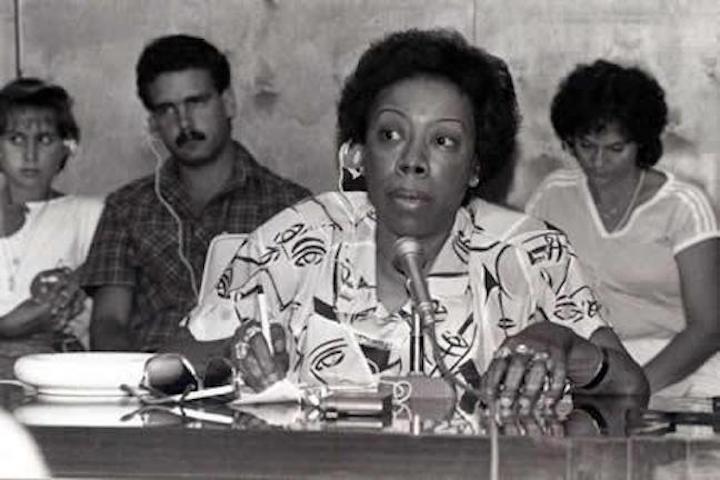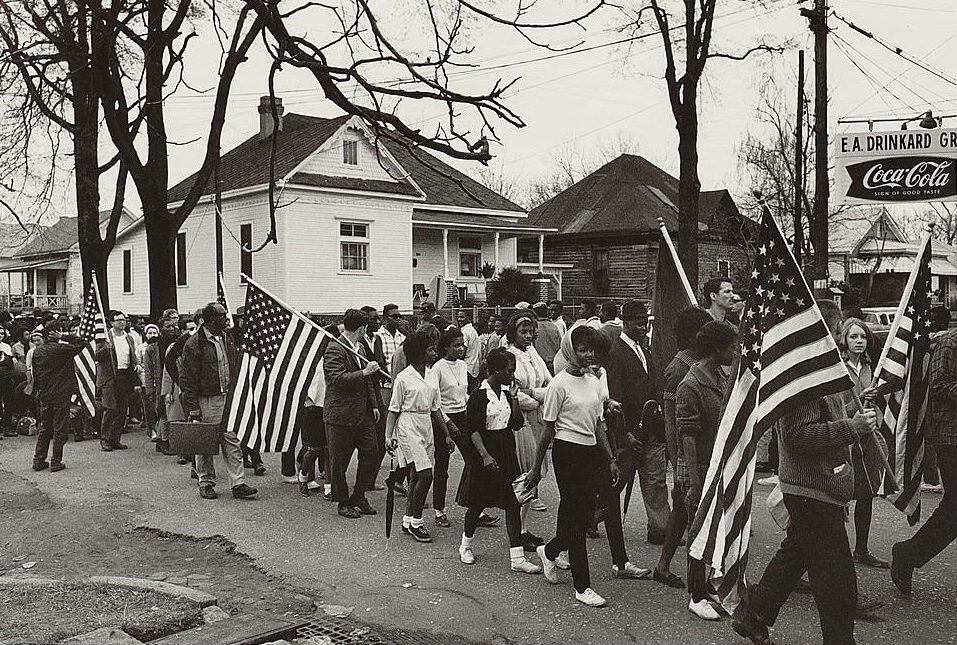Remembering Gwen Patton, Activist and Theorist

“Ideas are powerful,” Dr. Gwendolyn Patton used to say when she talked to the younger generation about civil rights and political organizing. This simple but powerful notion undergirded Patton’s incredible activist life, one that spanned much of the late 20th century and many different facets of the Black Freedom Struggle. Patton always contended that access to knowledge, and in particular, theoretical frameworks for understanding oppression and liberation, were key sites of protest and contestation. Weaving together a powerful life of theorizing and activism, she was and remains one of the most profound black thinkers of our lifetimes.
Patton was born outside Detroit, Michigan in 1943. Her early childhood was characterized by the dialectic between the trappings of middle-class life and insurgent black politics. She grew up in a comfortable black neighborhood and spent her summers with her grandmother in Montgomery, a hotbed of civil rights activism in the early 1950s. In 1960, after her mother passed away, she became a full-time Montgomery resident. As a teenager, she volunteered with the Montgomery Improvement Association (MIA), the organization responsible for the Rosa Parks-led boycott in 1955. When Patton went off to college at nearby Tuskegee University, she brought this zeal for activism with her. She joined several student-led organizations and protests and eventually became the first woman student body president of the university.
At Tuskegee, Patton was part of what she called a “close-knit, intellectual student movement” that engaged in public accommodation desegregation battles and voter registration work. She noted that she and her fellow students engaged in “deep discussions” about the nature and philosophical underpinnings of their organizing. They also supplemented their activism with study groups in which they “read anything and everything on and by Nelson Mandela and the African National Congress,” as well as Jomo Kenyatta’s Facing Mount Kenya and Frantz Fanon’s Wretched of the Earth. This was a formative time for Patton, in which she developed her analysis and ideological worldview. She often published articles in the campus newspaper in which she not only encouraged students to get involved in civil rights organizing but also challenged them to develop theoretical frameworks that fit their lived experiences and organizing goals.

Campus life, and the movement unfolding around her, led Patton to join the Student Non-Violent Coordinating Committee (SNCC), which had a strong presence at Tuskegee. She eventually joined the SNCC-supported Lowndes County Freedom Organization (LCFO), which was the original Black Panther Party. In 1966, LCFO-BPP members engaged in a grassroots political campaign to elect black residents in local-level political offices. Using the snarling black panther as their symbol, these activists attempted to achieve Black Power through local black political control. LCFO-BPP and SNCC members lost the November 1966 election but helped transform the nation’s consciousness about black-centered organizing. After the election, SNCC adopted Black Power as its official organizing strategy and mantra. Patton endorsed SNCC’s adoption of the political philosophy, arguing that she did not see “separation as divisive, but rather complementary. Black power demanded a strategy in which black people would transform the powerless black community into one that could exert its human potential to be an equal partner in the larger society.”
Living and working on a college campus also brought issues of anti-imperialism and internationalism to the fore. As student body president, Patton found that the Vietnam War was taking its toll on young black men. Nowhere was this more evident than in the death of her fellow student and activist, Sammy Younge, who returned from duty only to be killed for using a “white only” bathroom in 1966. His death not only caused the SNCC to formally voice their opposition to the Vietnam War, it also transformed Patton’s perspective. After leaving Tuskegee, she helped organize the National Black Antiwar Antidraft Union (NBAWADU), designed to develop a black-centered anti-war and anti-imperialist front. As the Executive Secretary of the group, Patton penned some of the black freedom movement’s foundational anti-war documents, including speeches on the “Role of Women in Revolution.” She also developed a bevy of position papers that connected American imperialist atrocities abroad with the state’s treatment of black Americans at home.
Patton constantly centered black women within her pro-black, anti-imperialist politics, making her a foundational figure in late 1960s black feminist theorizing. Living and working alongside SNCC organizers like Faye Bellamy and Ethel Minor foregrounded the importance of developing emancipatory projects that were gender-inclusive. Patton was largely responsible for creating the Black Women’s Liberation Committee (BWLC), a women’s collective within SNCC. This group engaged in central questions about the ideological underpinnings of women, gender roles, and revolution. The philosophical foundations that Patton developed in BWLC documents became the ideological scaffolding for the Third World Women’s Alliance, or TWWA, one of the first groups to formally organize around an intersectional platform. Patton also authored many articles addressing the complex gender politics embedded in Black Power organizing. She was one of the activists who contributed to Toni Cade Bambara’s now classic The Black Woman: An Anthology. Her article about the “Victorian Ethos” was an early take on the pitfalls of respectability politics in political organizing.
Patton continued her rigorous organizing schedule throughout the 1970s and 1980s, working in New York and Washington, D.C. She was active with the National Association of Black Students (NABS), part of a student movement front aimed at challenging multiple facets of white supremacy. She also continued to author articles about political ideology and the state of the movement, like her 1975 “Open Letter to Marxists,” in which she chided her contemporaries for letting their fractious debates about ideological clarity cloud movement organizing. She eventually earned a masters and doctorate and began teaching in the communities in Alabama in which she grew up. Patton became the archivist for Trenholm State Technical College in 1992. Housed in the community in which she worked, the collections Patton compiled are an impressive testament to her intellectual and activist life, and to the lives of her fellow organizers.
This archive reveals what Patton often told young scholars in person: not only are ideas powerful, but the power of ideas comes from basing them on how we live. Even a short overview of Patton’s amazing life reveals how she consistently worked to develop accurate analyses of the lived conditions and freedom dreams of black people. When existing frameworks were insufficient, she adapted her mentality and worked to create new organizations and groups that were responsive to the political moment and the communities that she loved. She consistently emphasized that ideas are valuable currency and that we must create and trade in ones that are black-centered and intersectional. Her energy, her ideas, and zest for the life and the movement are as critical as ever today. She will be missed. However, the power of her ideas will live on.
Copyright © AAIHS. May not be reprinted without permission.
Thanks for this insightful post into the activism of Gwen Patton. I represented her, on behalf of the Center for Constitutional Rights, in her suit against Alabama State University for non-reappointment in the 1980’s. In our many discussions, she never spoke of her activist history, though she was very active at the time. I feel badly that I did not do a better job of keeping in touch with her. Thanks for reminding us of her tremendous political activity.